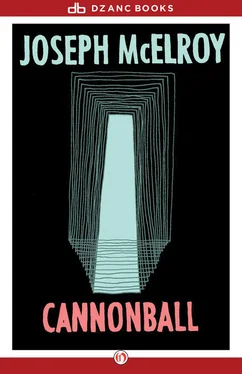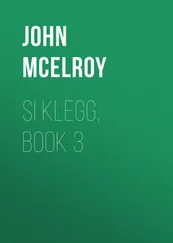Joseph McElroy - Cannonball
Здесь есть возможность читать онлайн «Joseph McElroy - Cannonball» весь текст электронной книги совершенно бесплатно (целиком полную версию без сокращений). В некоторых случаях можно слушать аудио, скачать через торрент в формате fb2 и присутствует краткое содержание. Год выпуска: 2013, Издательство: Dzanc Books, Жанр: Современная проза, на английском языке. Описание произведения, (предисловие) а так же отзывы посетителей доступны на портале библиотеки ЛибКат.
- Название:Cannonball
- Автор:
- Издательство:Dzanc Books
- Жанр:
- Год:2013
- ISBN:нет данных
- Рейтинг книги:5 / 5. Голосов: 1
-
Избранное:Добавить в избранное
- Отзывы:
-
Ваша оценка:
- 100
- 1
- 2
- 3
- 4
- 5
Cannonball: краткое содержание, описание и аннотация
Предлагаем к чтению аннотацию, описание, краткое содержание или предисловие (зависит от того, что написал сам автор книги «Cannonball»). Если вы не нашли необходимую информацию о книге — напишите в комментариях, мы постараемся отыскать её.
continues in McElroy's tradition of intricately woven story lines and extreme care regarding the placement of each and every word. A novel where the sentences matter as much as the overall story.
Cannonball — читать онлайн бесплатно полную книгу (весь текст) целиком
Ниже представлен текст книги, разбитый по страницам. Система сохранения места последней прочитанной страницы, позволяет с удобством читать онлайн бесплатно книгу «Cannonball», без необходимости каждый раз заново искать на чём Вы остановились. Поставьте закладку, и сможете в любой момент перейти на страницу, на которой закончили чтение.
Интервал:
Закладка:
The evening was not well attended. We were missing the assistant coach at the high school Wick and his wife, and my brother and Liz and Milt. Sinatra singing “Five Minutes More,” my mother handed me a platter to carry in from the kitchen. My aunt and uncle came for the fresh local shrimp and turkey molé and spoke cordially of this friend of mine they had yet to meet because a young Mongolian (of all things) Sumo had taken Osaka by storm (they laughed frowning at this), broken taboo by taking prize money with his left hand, being left-handed, but in Japan you don’t throw your opponent by yanking him forward by the hair and he’d had to go back to Mongolia until things cooled down. Umo himself, I pointed out, had told me how this Asashōryū glared, but Umo was a diver, he was not into Sumo, in fact I didn’t know where he was (I felt my sister smiling on me — the way I had said it).
I hadn’t seen him in weeks.
Had I done something? We gather what we can together, and that’s it.
My sister made an impromptu speech, wordy for her, in honor of the breadwinner who brings home his loaded gun unfired, and in a moment slightly embarrassing but we didn’t quite know why, she remembered wrestling in the living room with brother Zach over a joke and Dad’s not breaking it up—
He came upon us wrestling—
Angry on the rug.
Father to us both, he thought
Fight — or sport — or hug.
They dive into their home work—
Espousing not to shirk.
His kids — for all they lack—
Making the path they track.
— and that on the camping trip we had taken with Dad I had seen an indigo bunting on the Bradshaw Trail that wasn’t supposed to be there and Dad had said, But it is , and with his prompting we had taken another camping trip on our own and learned to make the path you follow even while hearing almost on top of us the aerial gunnery at Chocolate Mountain though we had wound up with all this food tonight, look only at the birthday dude and think of all the different people there in that chair, and someone had said this of James Thurber when he came to dinner.
My father and I didn’t bother telling each other what we each knew anyhow — his somehow quitting the Reserve, my more than impending enlistment. His shortness with me, and transferring the beribboned envelope, its own wrapping, unopened from the table to the top of my older brother’s straw sombrero he wore on the twenty-nine-dollar-a-weekday golf course on the floor — I felt it in the flush on my face a message in both directions telling me Dad was angry at having, in some original way, used me.
If he had, the phone call a month ago might be paying me off. How was not clear, an assignment the Army might not make good on or I could decline or not enlist.
Yet I was acting for myself. No matter what had been done to get me in. Less enlisting in the Army than enlisting the war in a plan of my own no dumber than other stuff I’d done. Family? East Hill? Math? Love? Getting in my own way, my mother just said when I ran into her in front of the Heartmobile having her picture taken by the butcher, a friend. I had asked my father when he got back from his strangely timed trip if he had checked into Umo’s activities on the east coast of Baja. Yes, he said, yes.
Yes? I said.
The kid was quite competent. “Competent!” A reliable shipper and contact person, my father understood, he would come in handy. “And for your information it’s a lot to say about anyone, that they’re competent.” I had missed something and it would come to me. The phone rang. “The envelope,” I said.
It was Milt’s surprised voice reminding me of The Inventor’s party, the scheduling conflict I regretted for my mother and sister’s sakes, respectively, the cook and, I sensed then and confirmed late that night in her room, the secret genius of the moment with whom I left the issue of the envelope. Though I picked it up— Happy Returns my sister had written on it — and carried it into the hallway.
“Thank you,” my father said, his napkin in hand, appearing and taking the envelope from me. I didn’t much want to see what was inside right then and neither did he. A wide and brilliant smile in a narrow face — stranger than truth — there was a joke on someone. I said I was enlisting in the Army and had taken a physical this—“It’s your decision,” my father broke in. “That’s what I’m saying, Dad.” “If you were in the Reserve you’d be out sooner,” he said. “Feet first,” I pulled open the somehow heavy front door into the night. I said I thought the President would let me go in good time. “And good luck with your…” I looked him in the face and didn’t flinch at the unknown, a touchy man, enterprising, but why this outlandish hook-up or patron, Storm and with a last name Nosworthy at that?
I heard his interrupting as I ran for a bus that waited. A physical this morning ?
You cannot fly but your body will sometimes feel spread out, there is so much of it, hand to mouth we say, hand, arm, shoulder, belly, and in the whole body with a little help from our friends there is not only a future but a gift to see it. I couldn’t have taken my sister, who seemed all the family I had sometimes when I would lie beside her talking, speaking.
I had signed up knowing that my father weeks since had quit the Reserve somehow. He himself was surprised, he said, in moments of humor as soon as I was out the door, I learned; but at what? At himself that he’d resigned? That his son had enlisted? The two. “Happy birthday,” my sister said all over again across the table at him upon this last, she told me very late that night when I came home to tell her about Milt and Umo and the state cop Zoose and his sister dancing alone because her husband was in the Army, and the others. Was he surprised that I didn’t break with him? (He’d resigned, because he’d been given leave to. In return for what?)
My sister and I that night and always in touch, and presently as fleeting e-mails would remind, tracking me not really. Yet, in my hopes of some secret employment, this person mine — her quaint hand on my heart, words on her lips, her words on my skin now and again, words in the dark touching my words, even as we heard the footfall outside her door at three in the morning pause and pass on. Upon which she regretted doing what she’d done when she had read me my father’s entry in the Coaches Directory so long ago — omitting words, omitting words, her hand on my chest, perhaps waiting for me to ask, until I didn’t but I had already read them, they didn’t matter: you’re diving into the wreck of this war she said that night of my enlistment when I came home to her, it didn’t sound quite like her.
Others think they have plans for you but you keep a memory of your future free. The dive, its execution some say an infinite series of instants each bringing you somewhere as if you were stopped. No borrowed laptop at hand to tell my sister my orders came where I was billeted and apparently I would have company two mornings later. Meanwhile I waited in my own way. One afternoon I saw into a doorless home, not a rag of a curtain between me and that nearly impenetrable dusk and I was seen by faces, or in their alertness they were willing that I enter, perhaps it was to help the woman lying on a mat dead or sleeping even by spying. With what? A camera? A bow. In a hovel with a rifle bipod lying on a sandal in a corner, a talisman hanging on the wall, other people came in off the street, a gathering just to hear what might be said. Then I had to go. She was dead but her eyelids glued shut, willed, soldered, and I asked to use their e-mail, odd though the welcome seemed, and I asked as I typed myself in what “Arabiyoun ana Maisoon” meant and was told “I am an Arab,” and my sister wanted me to know that my 200 time that night of the ceiling had been a personal record.
Читать дальшеИнтервал:
Закладка:
Похожие книги на «Cannonball»
Представляем Вашему вниманию похожие книги на «Cannonball» списком для выбора. Мы отобрали схожую по названию и смыслу литературу в надежде предоставить читателям больше вариантов отыскать новые, интересные, ещё непрочитанные произведения.
Обсуждение, отзывы о книге «Cannonball» и просто собственные мнения читателей. Оставьте ваши комментарии, напишите, что Вы думаете о произведении, его смысле или главных героях. Укажите что конкретно понравилось, а что нет, и почему Вы так считаете.












